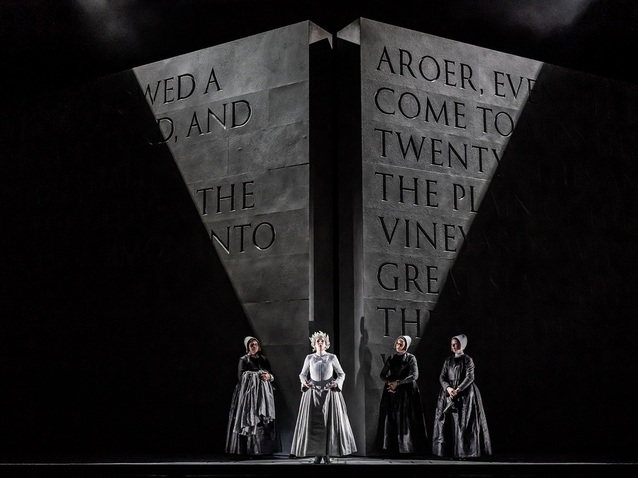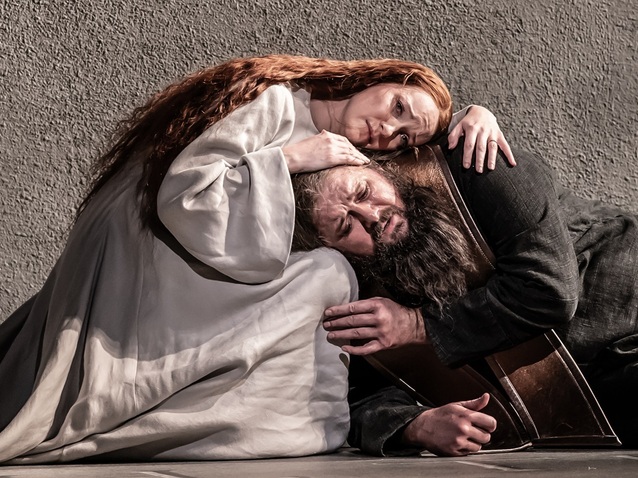 |
| Handel: Jephtha - Jennifer France - Royal Opera House (Photo: Marc Brenner) |
Handel: Jephtha; Allan Clayton, Alice Coote, Jennifer France, Cameron Shahbazi, Brindley Sherratt, director: Oliver Mears, conductor: Laurence Cummings; Royal Opera House
Reviewed 10 November 2023
An incandescent performance by Allan Clayton in the title role with superb support the other soloists anchors the imaginative if flawed dramatic recreation of Handel's final oratorio
In adapting the story of Jephtha from the Bible for a dramatic work for Handel, the librettist Thomas Morell had to use quite a bit of imagination, to create a three hour drama out of the relatively curt Biblical references. A fine classicist, Morrell introduced elements from Greek drama, creating a work that it is tempting to see as naturally having a place on the stage. Concert performances of Handel's Jephtha are relatively common and I have seen many fine incarnations of the title role including John Mark Ainsley at the London Handel Festival, James Gilchrist with The Sixteen, Nick Pritchard with the Academy of Ancient Music at the London Festival of Baroque Music, Allan Clayton with Scottish Chamber Orchestra at the BBC Proms.
But I have seen only been two significant stagings of the work, Frederic Wake-Walker's highly abstract one at the Buxton Festival in 2012 with James Gilchrist [see my review], and Katie Mitchell's highly realistic one which was widely shared with Mark Padmore in the title role [see my review of WNO's 2012 revival with Robert Murray]. These two took highly contrasting routes to solving the work's dramatic problems, because make no bones about it, staging a Handel oratorio is a challenge. Handel's imagination was a dramatic one, whatever he was writing, but writing oratorio meant that he no longer needed to worry about pesky dramatic conventions. His oratorios often compress the drama, strip the linking dialogue down to a minimum, and then have moments of complete dramatic stasis.
 |
| Handel: Jephtha - the Ammonites in Act One Royal Opera House (Photo: Marc Brenner) |
It was thus with great interest that we caught the second performance of Oliver Mears' new production of Handel's Jephtha at the Royal Opera House. Laurence Cummings conducted the orchestra of the Royal Opera House with Allan Clayton as Jephtha, Alice Coote as Storge, Jennifer France as Iphis, Cameron Shahbazi as Hamor, and Brindley Sherratt as Zebul. Sets were by Simon Lima Holdsworth, costumes by Ilona Karas, video by Sander Loonen, lighting by Fabiana Piccioli and movement by Anna Morrissey. In fact, Mears was working with the same team as his production of Verdi's Rigoletto.
Holdsworth's sets were based around two massive stone panels with writing on them, these moved, reconfiguring the space so that the more intimate scenes were far more acoustically sympathetic, but the big visual coup was that as well as the Israelites we saw their enemies, the Ammonites. These Israelites were a sort of religious sect, the visual imagery based on American sects like the Amish, all sober, grey and sensible. By contrast, the Ammonites were a riot of colour and vividness, the dancers playing the idea of licentiousness to the hilt. This visual contrast worked towards stimulating the drama in Act One, helping to avoid the feeling that can happen in this work that we are simply marking time till Jephtha's reappearance in Act Two. The problem is that for Act Two and Three, when the Ammonites disappear from the story, the whole visual feel was grey, albeit with some stunningly striking images.
Mears told the story well, we never felt the drama was underplayed even though there was as still an abstract element to the production. The handling of the big chorus numbers was a bit patchier, however. For significant parts of Acts One and Acts Two, he took advantage of the sect's religious nature to simply have the chorus sitting with the drama coming from the counterpoint of the Ammonites (Act One), or Clayton's Jephtha (Act Two). There were some music and movement choruses and thankfully movement director Anna Morrissey managed to avoid too many references to Peter Sellers' iconic semaphoring. But also, for the great choruses that end Acts One and Acts Three, Mears simply tidied the chorus away, either making them invisible or off stage. The focus of the end of Act One was the sight of Clayton's Jephtha praying amid a video of an eclipse of the sun, whilst the end of Act Three became about the principals, not the communal religious rejoicing. And here, Mears decided to subvert the ending, but the subversion all happened far too quickly and seemed far too off kilter from what had gone before, whilst having the chorus off stage simply nullified the thrilling effect of the choruses.
Here I can't help but say a word about the chorus itself. Clearly something was wrong, there was an element of disturbance in their performance. From the very opening, the chorus sound seemed rather underpowered and unfocused, but often in the choruses where the chorus moved the coordination between pit and stage became unstable. The result was that the performance lacked the power and intensity that we have come to expect.
The solo performances were simply terrific. As Jephtha, Allan Clayton was everything that one might want, and more. He has the power and the stamina for the role, yet his voice also had a terrific focus and intensity, whilst the definition of detail in his passagework was impressive too. And dramatically, he really incarnated the focused religious zealot who had a personal relationship with God. ' Open thy marble jaws, O tomb' in Act Two was stunning in its focused intensity whilst 'Waft her, Angels' at the climax of Act Three was incredibly daring in the way he fined the voice down, making it so intimate. So much so that, frankly, the remainder of the act was a bit of a let down.
Storge is the only other really well-developed character, and Alice Coote was on great form, though here her familiar all-encompassing style of performance was somewhat subdued under the dramatic necessity of being a demure wife as expect by the sect, though of course Coote's vivid sense of drama prevailed. 'Scenes of horror, scenes of woe' was one of the highlights of Act One, and her 'First perish thou' in Act Two seemed to project the drama into another realm, though her Act Three aria seemed somewhat underplayed though by then Mears ideas of recasting the drama had begun to take over.
This was a performance that really came alive from the moment that Jephtha realised what his vow meant in Act Two; from then on, the drama was completely absorbing, becoming about the intense interaction between the principals, so that the quartet in Act Two became an engine of the drama, developing what had gone before. The shame was that Mears did not seem to be able to bring the chorus into this, they remained at the side.
The role of Iphis is a relatively ungrateful one, she is to an extent rather passive. But Jennifer France made her engaging from her first entry and this Iphis might have been constrained by her parents' religion, but she certainly was not confined and France developed Iphis into a real character, all the while engaging with some superb singing. What really made this strand of drama work was the way that France and Cameron Shahbazi as Hamor developed Iphis and Hamor's relationship into one that weathered ups and downs, endured. Central to this was the way that his Hamor was traumatised by his participation in the decisive battle that comes between Acts One and Two. Handel uses Hamor as narrator here, but Mears and Shahbazi made him an unwilling participant who is left shell-shocked.
Zebul, Jephtha's brother, is rather a cipher too. His main appearances are at the opening of Act One and the end of Act Three, but Brindley Sherratt's performance was so present, so vividly engaged and engaging, that he made the character part of the drama. As ever with Sherratt, you got the sense that this character really mattered and, considering that Sherratt has been moving into Wagnerian territory, the Handel singing was terrific too.
There is one extra character, of course, the Angel. This was played by a boy, Ivo Clark, who portrayed Iphis' younger brother. Clark gave a confidently poised account of the Angel's aria, and then became central to Mears' recasting of the final moments of the drama.
Diction varied from the good to the terrific, this was one of those English performances where the surtitles were definitely unnecessary. And, as ever with oratorio, the performance was really about the words.
 |
| Handel: Jephtha - Jennifer France, Allan Clayton - Royal Opera House (Photo: Marc Brenner) |
One final moan about the production. This featured a lot of extraneous noise from the performers, chorus and soloists, as if Mears could not find the complete drama in Handel's music. Some of the shouts and calls were understandable, but there were too many moments when the extra soundtrack was, to my ears, a bit too much.
In the pit, the orchestra of the Royal Opera House was directed from the harpsichord by Laurence Cummings, meaning that the textures benefited from having two harpsichords and theorbo supporting the modern instruments. The results were impressive even if not quite a stylish as some other modern instrument ensembles playing Handel. Cummings seemed to take quite a conservative approach to speeds, and the results were steady rather than dynamic, but he is a fine accompanist and in the solo moments we had plenty of sympathy.
This was one of those performances about which you felt, if it had to be done then 'twas well done. But did it need doing? As I have said, the drama really took off from Allan Clayton's appearance in Act Two and frankly the work was very much about his Jephtha with stunning partnership from Coote's Storge and support from the other principals. I am not sure that Mears' quite rose to the challenge of the problems of staging an oratorio, but there was plenty of food for thought and some terrific singing.
Never miss out on future posts by following us
The blog is free, but I'd be delighted if you were to show your appreciation by buying me a coffee.
Elsewhere on this blog
- A shadow land where ideas of what music could be are changed: Nwando Ebizie on her new work for London Sinfonietta's Writing the Future - interview
- Never a dull moment: Edward Lambert's Masque of Vengeance, a taut and driven new opera based on Thomas Middleton's 17th-century play, The Revenger's Tragedy - opera review
- Flute explorations: lesser-known Schubert, early Beethoven and the father of Swedish music - record review
- Infinite Refrain: Music of Love's Refuge - Celebrating 17th-century Venice as a place of tolerance for gay artists - record review
- The Monarch's Music: recorded as part of Queen Elizabeth's Platinum Jubilee celebrations and released to serendipitously celebrate the 2023 Coronation - record review
- Cyrillus Kreek: Sacred Folk Tunes - an iconic work by one of the founders of Estonian music recorded by a fine Estonian choir - record review
- Escape to the Country: Rachmaninov at Ivanovka at the London Song Festival with soprano Alexandra Dunaeva & countertenor Iestyn Morris - concert review
- Music knows no borders: countertenor Reginald Mobley on the music of Ignatius Sancho, spirituals as Early Music and the importance of diversity - interview
- An evening of wit, delight and magic: Silent Slapsticks at The Ritzy with Brixton Chamber Orchestra - film review
- The level of polish & perfection is remarkable: Apollo5's Haven - record review
- Home











No comments:
Post a Comment